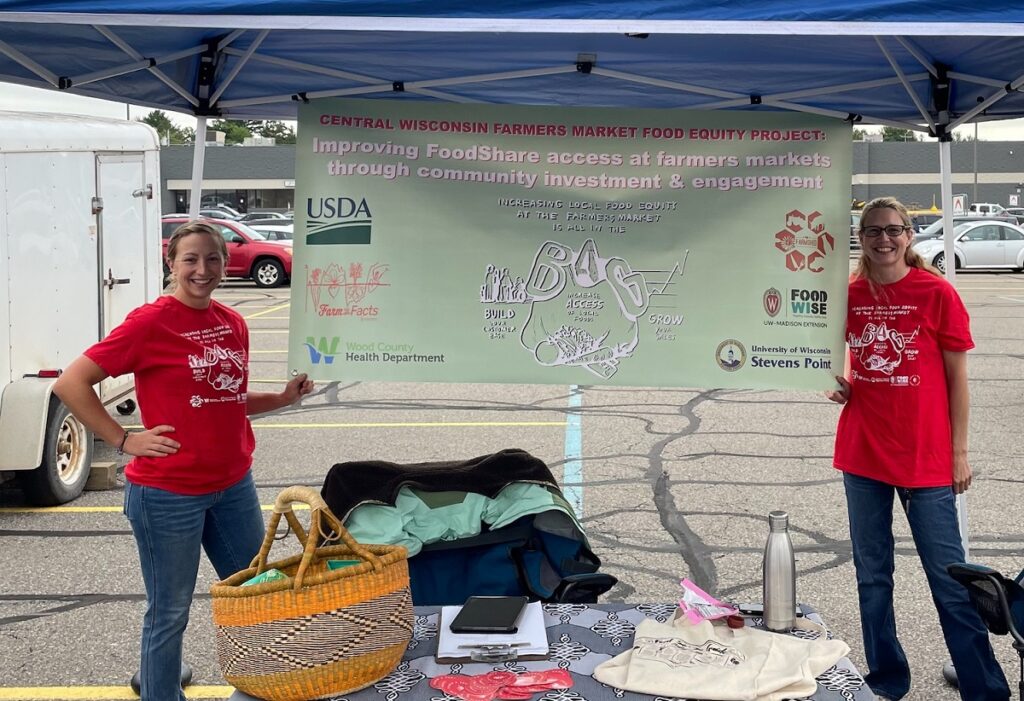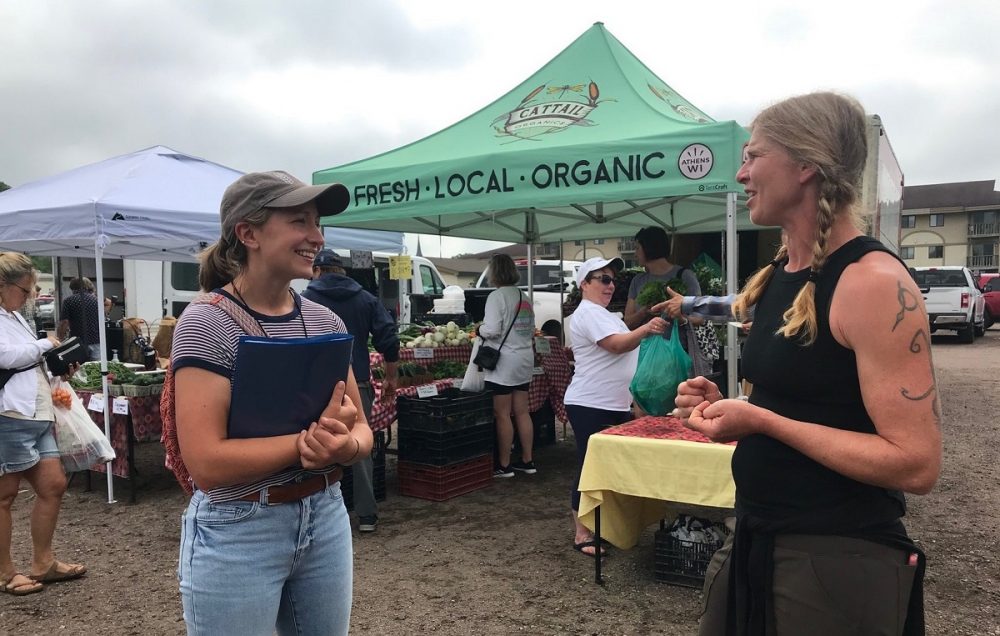
Alumna Taylor Christiansen (left) and Alissa Lick, graduate assistant in the Sustainable and Resilient Food Systems program at UW-Stevens Point, are at the Marshfield farm market, one of six where customers and vendors are being surveyed.
Current and former UW-Stevens Point students are working to improve access to nutritious food at farmers markets in central Wisconsin.
Thanks to a U.S. Department of Agriculture grant of $200,000, they are studying farmers markets in Adams, Marshfield, town of Rome, Stevens Point, Waupaca, Wausau and Wisconsin Rapids. The project aims to establish a Central Wisconsin Farmers Market Collaborative that will increase access for low-income residents to healthy, local food access and develop business plans that strengthen farmers markets through community partnerships and investment.
“This project has been in progress for a number of years — and we finally cracked through the funding and started research this year into how we can sustainability support low-income families to have equal opportunities to shop at Central Wisconsin farmers markets,” said Kelly Hammond, Healthy Communities Coordinator for Clark, Marathon, Portage and Wood counties.
The research is being done by alumni and student interns in sustainable food and business programs at UW-Stevens Point and UW-Madison. They visit the six farmers’ markets monthly, talking to vendors and 30-40 customers each time. They ask customers how far they traveled to get to the market, how often they shop there, how much they expect to spend, whether they will shop elsewhere that day and whether they have used electronic benefits transfers (EBT) or FoodShare at the market, said Taylor Christiansen, Regional Farmers Market Coordinator.
“A goal is to increase access to fresh fruits and vegetables,” Christiansen said. “This is a data-driven study to see if more EBT leads to more consumption of healthy food.”
These markets vary greatly in size, location, offerings and atmosphere, Christiansen said. Some offer primarily hand-crafted items, others have more prepared foods and some are hubs for community activities. “Every market is a snowflake, unique in their own way.”
She and Hammond are both graduates of the sustainable and resilient food systems master’s program at UW-Stevens Point.
The study also explores whether the market has the ability to process EBT for Supplemental Nutritional Assistance Program recipients. If EBT is available, data is collected on how it’s run, whether it is profitable and how the program can be made more sustainable.
Farm market vendors don’t always see a benefit to using EBT, Hammond noted. “FoodShare works well for grocery stores where there’s one main terminal, but it’s much more complicated at a market where there are dozens of different vendors and products.” If cash is the only tender, farmers markets are less accessible to those who use credit, debit, FoodShare or other programs.

Alumna Taylor Christiansen (left), regional farmers market coordinator, is among collaborators aiming to increase access to local food and strengthen markets through community partnerships. Here, she speaks with farmer Kat Becker of Cattail Organics at the Wausau Farmer’s Market.
The study is a collaboration with UW-Madison as well as local health departments and local farmers market associations. They will collect research for two years before making recommendations. “With a broad network of folks across the state, funding from the USDA Local Food Promotion Program Grant and a solid plan with evidence-based research, we are well positioned to make lasting change,” Hammond said.
In the second year, they will gather data on markets’ impact on the region and identify possible obstacles, such as parking, signage and overall awareness.
Graduate assistant Alissa Lick, also in the sustainable food systems program, and MBA fellows from UW-Stevens Point then will work with vendors to identify needs and outline strategies to address them. They will also help people become aware of the various programs available and try to erase stigmas. From UWSP students to seniors on fixed incomes, many people use FoodShare, Lick said.
Helping with data collection as an intern at the Waupaca farmer’s market reminded Julia Perock how important markets are in providing nutritious foods to the community, said the senior majoring in sustainable food and nutrition at UW-Stevens Point. “I want to work with the farm-to-table effort in my future,” Perock said. “Being involved with the farmer’s market has helped me get a better understanding of what it takes to grow food and keep it healthy for the customers. Farmers markets serve as a community hub for people to gather, share their interest in sustainable eating and talk to the people who are growing their food.”
This collaboration is a great opportunity for students to work with and be mentored by professionals in agencies they aspire to join, said Annie Wetter, professor of nutrition, and graduate program coordinator at UW-Stevens Point. Most UW-Stevens Point graduate programs in the School of Health Science and Wellness require students to connect to a community development movement, effort, program or agency.
“University-community collaborations such as this project enrich students’ educational experience by providing them with opportunities to apply their classroom learning in their own backyard. Students build skills relevant to their career goals while bringing much needed capacity to community development efforts that improve the wellbeing of Central Wisconsin residents,” Wetter said. “It’s a win-win-win for students, agencies, and the community.”
The community partnership includes 20-30 agencies and businesses, including UW-Stevens Point.
“Three UWSP graduates/students are collaborating to create lasting, incredible change to our food systems in Central Wisconsin,” Hammond said. “Isn’t it fun?”
Written by UW-Stevens Point
Link to original story: https://www.uwsp.edu/news/helping-more-people-access-farmers-markets/
